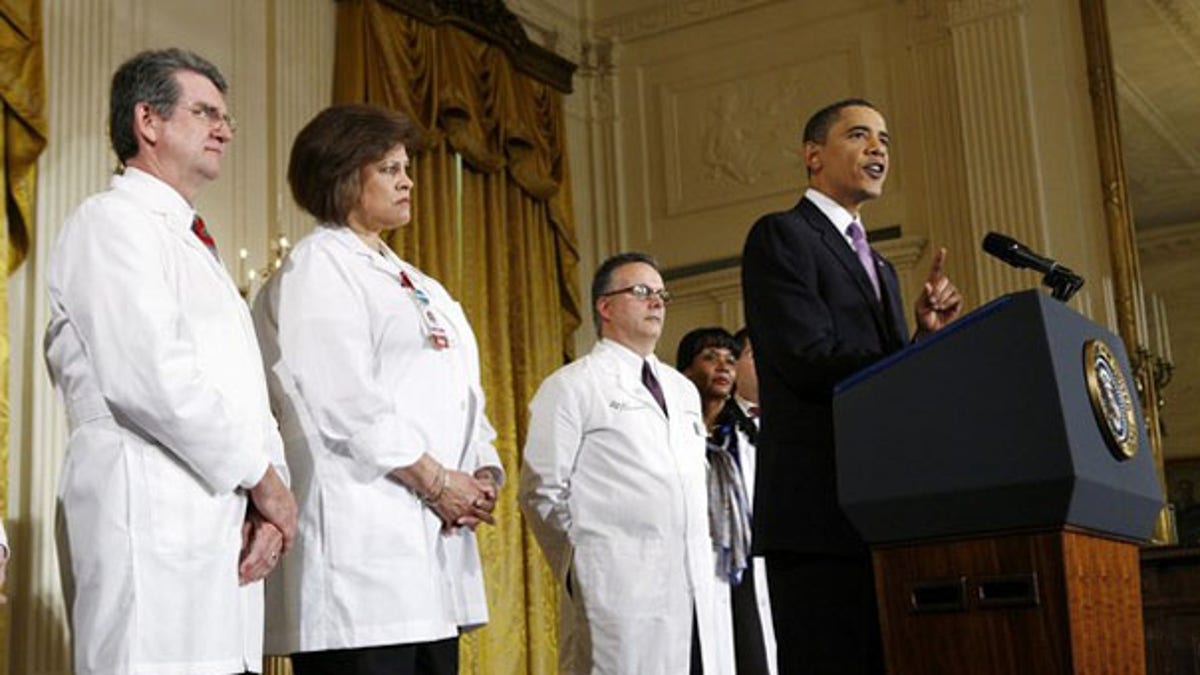
President Obama speaks about health care reform, as medical professionals look on, at the White House in Washington March 3. (Reuters Photo)
President Obama urged Congress to schedule a vote on health care reform in the "next few weeks," declaring Wednesday that it's "time to make a decision" on the package, the product of a yearlong debate.
The president described the bipartisan summit held last week in Washington as the last leg of the health care reform debate. He said all arguments have been exhausted and that Congress owes the American people a final "up-or-down" vote.
"Every argument has been made," he said. "Everything there is to say about health care has been said and just about everybody has said it. So now's the time to make a decision about how to finally reform health care so that it works, not just for the insurance companies, but for America's families and America's businesses."
The president, who is pressing forward with health care reform despite a nationwide clamor to address jobs creation -- and despite the upset election of Republican Scott Brown to U.S. Senate in January -- stressed that he is not concerned about the risky politics of pushing ahead. Though Democrats are planning to use a controversial tactic known as reconciliation to pass the bill in the Senate with a 51-vote majority, the president said that passing health care reform is "right," even if it has electoral consequences.
"We can't just give up because the politics are hard. I know there's a fascination, bordering on obsession, in this media town about what passing health insurance reform would mean for the next election and the one after that. ... I will leave it to others to sift through the politics. Because that's not what this is about. That's not why we're here," Obama said. "They are waiting for us to act. ... I do not know how this plays politically, but I know it's right."
His appeal came several days after the president convened a bipartisan summit with lawmakers of both parties, then released a revised plan that he said incorporated several GOP suggestions.
Even so, Republicans are solidly opposed to the legislation, demanding instead that Obama and Congress start over again.
Obama said Wednesday that a "piecemeal" approach is not prudent.
"The fact is that health reform only works if you take care of all these problems at once," the president said. And he said that to start over "could simply lead to delay that could last for another decade or more."
At its core, Obama's proposal would extend health care to tens of millions of uninsured Americans, while cracking down on insurance company practices such as denying coverage on the basis of a pre-existing medical condition.
There is still no certainty about the outcome -- or even that Democrats will agree to the series of changes that Obama said represented Republican contributions.
Senate Republican Leader Mitch McConnell said that a decision by Democrats to invoke rules that bar a filibuster would be "met with outrage" by voters, and he said Obama was pushing a sweeping bill that the public doesn't want.
"They've had enough of this yearlong effort to get a win for the Democratic Party at any price to the American people," McConnell said on the Senate floor.
Even if Obama's maneuvering draws no Republican support, the White House and Democratic congressional leaders hope it will give comfort to moderate to conservative members of their own rank and file whose votes will be essential to passage.
"I like the idea that the president is working with Republicans and trying to find common ground," said Sen. Mark Pryor, a centrist Democrat from Arkansas. "I think that's a good place to be for him; I think that's what the American people want to see."
The Democrats' strategy includes several steps. The House would be required to pass the legislation the Senate passed late last year, and then both houses would be called on to enact a companion bill making changes in the first one.
Obama has already made the basics of his plan clear. He would extend health coverage to about 30 million uninsured Americans, leash the insurance industry by banning practices like denying coverage for the ill, expand drug benefits for the elderly and give lower-income people subsidies to help them afford coverage. It would be paid for by raising taxes on upper-income Americans and culling savings from Medicare.
In a letter to congressional leaders Tuesday, Obama went further. He said he was exploring GOP proposals for cracking down on fraudulent medical charges, revamping ways to resolve malpractice disputes, boosting doctors' Medicaid reimbursements and offering tax incentives to curb patients' visits to doctors.
The ideas included an experiment that would establish special courts in which judges with medical expertise would decide malpractice allegations. The idea has been criticized by the Center for Justice & Democracy, a consumer group that prefers the current system of awarding damages. It said health courts would be "anti-patient."
To round up votes, Democratic leaders have been citing polls showing that many voters dislike the overall idea of a health overhaul but favor specific proposals. One presentation by the Democratic firm Lake Research Partners suggests that lawmakers emphasize benefits that would take effect this year, like preventing insurers from denying coverage to those already sick and beginning to improve seniors' pharmaceutical coverage.
The Associated Press contributed to this report.




